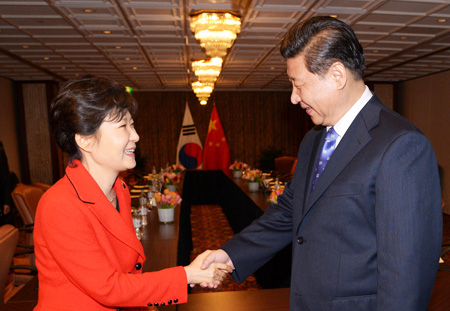- California Assembly OKs highest minimum wage in nation
- S. Korea unveils first graphic cigarette warnings
- US joins with South Korea, Japan in bid to deter North Korea
- LPGA golfer Chun In-gee finally back in action
- S. Korea won’t be top seed in final World Cup qualification round
- US men’s soccer misses 2nd straight Olympics
- US back on track in qualifying with 4-0 win over Guatemala
- High-intensity workout injuries spawn cottage industry
- CDC expands range of Zika mosquitoes into parts of Northeast
- Who knew? ‘The Walking Dead’ is helping families connect
All eyes on THAAD decision after S. Korea’s participation in AIIB

President Park Geun-hye shakes hands with Chinese President Xi Jinping after a summit at The Hague last year. (Yonhap)
By Chang Jae-soon
WASHINGTON, March 26 (Yonhap) — South Korea’s decision to participate in the Chinese-led regional development bank AIIB put an end to one of the two most vexing dilemmas the country has grappled with in recent months between its biggest trading partner, China, and traditional ally, the United States.
Now, all eyes will be on the other, perhaps harder, question: Whether it should agree to the U.S. deploying a THAAD missile defense unit to the country, despite strong objections from China, which sees the potential deployment as a security threat.
Seoul’s decision to join the Asian Infrastructure Investment Bank (AIIB) came as no surprise since Britain, France and other European nations have joined the bank, seen as a Chinese effort to further bolster its economic clout by creating a counterbalance to the U.S.-led Asia Development Bank.
These decisions were apparently an embarrassment and blow to the U.S., which has been negative about the AIIB and has questioned whether the envisioned lender will have the necessary transparency and high standards of governance.
“I am not going to react or comment on their decision,” State Department spokesman Jeff Rathke said at a regular press briefing Thursday. “I would say in general we’ve seen a number of countries make decisions to join the bank. That is their decision. We certainly hope that as we stress the importance of international standards and transparency, that there will also be voices for those same values.”
The AIIB and the Terminal High Altitude Area Defense (THAAD) missile system have been the hottest political and diplomatic issues facing South Korea in recent weeks, reflecting the difficulty of walking a tightrope between the U.S. and China.
Few disagree Seoul would face more such dilemmas as China further expands its influence in the region and beyond.
South Korea’s decision to join AIIB has immediately touched off speculation that the decision could be traded off for Seoul’s decision to allow the U.S. military to deploy a THAAD battery.
But American experts said they see no link between the two issues.
“I am sure that the Korean government will say that it will treat the THAAD decision as a separate issue based on its own interests and needs. There is no need to link it to AIIB,” said Scott Snyder, a senior researcher on Korea at the Council on Foreign Relations.
Snyder said Seoul’s participation in AIIB has been widely expected.
“The main challenge for the future of AIIB, and so as to avoid the emergence of a negative competition among multilateral lending institutions, will be for AIIB to develop transparent governance practice and effective standards for preventing corruption or pursuing projects that degrade the global environment,” he said. “These are areas where there will be high expectations for South Korea and other AIIB founding members to have influence, if the project is to succeed.”
Jonathan Pollack, a senior fellow at the Brookings Institution, also said that AIIB and THAAD are very different issues that “have to be weighed on the basis of how the ROK views its interests.” A more interesting question would be whether Seoul were to decide to join the Trans Pacific Partnership in light of the AIIB decision, he said.
Alan Romberg, a distinguished fellow at the Stimson Center, said he heard about the idea about “compensation” for an AIIB decision with a decision on THAAD, but the two issues should be approached separately on their own merits.
With the AIIB, he said, Korea’s participation would be a bad decision unless the country insists on adopting the highest international standards of governance and transparency.
“On THAAD, according to my understanding, from a national security perspective, it makes sense for the ROK to acquire it. We all realize the considerations that might cause hesitation, but one hopes that real needs will drive the decision,” he said.















